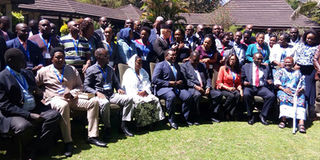Lusaka urges senators to create harmony with governors

Senators at Simba Lodge in Naivasha on September 18, 2017 on the first day of their induction after election. Speaker Ken Lusaka urged them to conduct their duties in accordance with the law. PHOTO | ERIC MATARA | NATION MEDIA GROUP
What you need to know:
- Mr Lusaka said the first Senate was characterised by supremacy battles between senators and some governors.
- The senators will be attending the induction workshop the whole of this week.
- Lusaka said majority of the members of the first Senate lost objectivity in their oversight role.
Senators have been urged to play their oversight role of counties in accordance with the law and to avoid witch hunt and victimisation of governors.
Speaking during the opening of an induction workshop at Simba Lodge in Naivasha, Senate Speaker Kenneth Lusaka said members of the previous House abused their positions and engaged in all manner of allegations against county bosses.
Mr Lusaka said the first Senate was characterised by supremacy battles between senators and some of the governors who were accused of mismanaging county funds.
The House Speaker called on members to ensure that the Senate clearly and strictly demarcates boundaries of its oversight role and the county assemblies over the county executives.
“In the past, we have had some audit queries that were supposed to be dealt with at the county assembly brought to the Senate. Overlapping and duplication of roles serves no purpose, but simply creates confusion and wastage of public funds,” Mr Lusaka said.
The senators will be attending the induction workshop the whole of this week.
OBJECTIVITY
The Speaker told senators to ensure that anytime they summon county bosses to appear before them for questioning, it should not out of malice, but strictly on accountability purposes.
According to the Speaker, a majority of the members of the first Senate lost objectivity in their oversight role because they were eyeing the governorship seat.
The onerous duty, Mr Lusaka noted, was to dispel what he termed as a negative notion by Kenyans that the Senate had little significance or relevance, and should be scrapped.
He told members that Kenyans clamoured for the return of the second chamber as an important principle of moderation and quality control in the conduct of matters of state and governance in Kenya.
“The re-introduction of the institution of the Senate has been to a large measure, in my view, an attempt to meet this need. "
DIFFICULTIES
Turning to the processing of Bills, Mr Lusaka told members that difficulties were experienced in the application of Article 110 of the Constitution which affected the output of the Senate.
“This has been and still remains a matter of great concern that will require deeper consultation, concerted effort and appropriate tact among the Senate leadership and membership so that the issue is fully resolved,” he said.
Representing the Minority leader, Homabay Senator Moses Kajwang called on his colleagues to cast their political differences aside and focus on the four day induction course.
He called on members to revolutionise the Senate by adopting a proactive approach to issues. “We were like morticians doing postmortem but we want to have a different approach to issues,” said Mr Kajwang.
He caused laughter when he told the members not to turn the Senate into a ‘slaughterhouse’ for the governors.
WORKSHOP
He said members will start having sessions in the counties as a way of having a break from the past, expressing optimism that the issue of tyranny of numbers will not come into play while legislating in the House.
The workshop aims at assisting members acquaint themselves with evolving and inter-connected governance architecture, including linkages with other constitutional bodies.
Among the things to be discussed in the retreat is the mandate and functions of the Senate and how it relates with other arms of government, constitutional commissions and independent offices such as the Commission on Revenue Allocation, Controller of Budget and the Ethics and Anti-Corruption Commission.
Also on the discussion table is how the House relates with the Office of the Auditor General, the Kenya National Human Rights Commission and the importance of the independence of Parliament, specifically the Senate, in efforts to achieve harmony.






